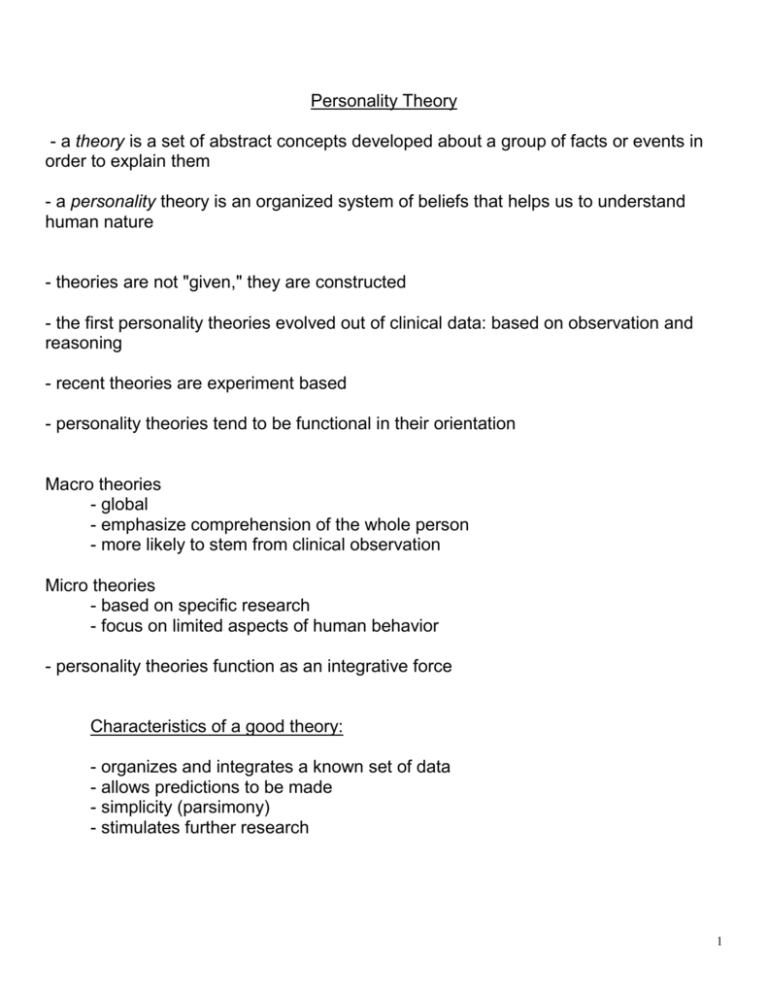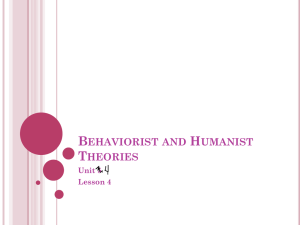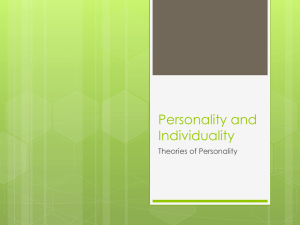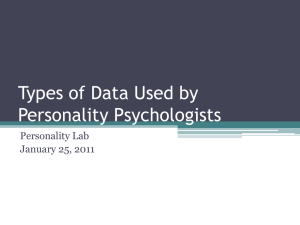Personality Theory
advertisement

Personality Theory - a theory is a set of abstract concepts developed about a group of facts or events in order to explain them - a personality theory is an organized system of beliefs that helps us to understand human nature - theories are not "given," they are constructed - the first personality theories evolved out of clinical data: based on observation and reasoning - recent theories are experiment based - personality theories tend to be functional in their orientation Macro theories - global - emphasize comprehension of the whole person - more likely to stem from clinical observation Micro theories - based on specific research - focus on limited aspects of human behavior - personality theories function as an integrative force Characteristics of a good theory: - organizes and integrates a known set of data - allows predictions to be made - simplicity (parsimony) - stimulates further research 1 Three Research Traditions in Personality 1. The Clinical Approach - theories are based on experiences with clients - studies the individual or a few individuals - holistic: focuses on the whole person - involves careful listening and observing - initiated with Freud - brilliant observer - has led to very different macro theories Freud: - unconscious processes - sexual and aggressive instincts - early experience shapes personality - anxiety and defense mechanisms Rogers: - focus on the self - movement toward growth and self-actualization - entered the subjective world of the client and tested change objectively - Kelly: - the person as "scientist" - constructs: how the world is interpreted - constructs can be too rigid, or randomly applied Strengths of the Clinical Approach: - observe a great variety of phenomena - focuses on the person as a whole - generates new observations - generates many hypotheses Limitations of the Clinical Approach: 2 - reliability of the observations - difficult to test hypotheses 2. The Correlational Approach - uses statistical methods to establish the association between sets of measures. - emphasizes individual differences - attempts to establish relationships among these differences e.g., how parental intelligence is related to offspring intelligence - uses data obtained on large numbers of subjects - focuses on parts of the personality - initiated with Galton - furthered by Spearman: factor analysis - start with a large mass of data e.g., related to abilities and skills - identify commonalities – factors e.g., vocabulary, verbal reasoning, mathematical Cattell (1943): - the birth of traits – fundamental units of personality - data from many ratings and questionnaires are put through factor analysis to identify items that are similar Carver & Scheier (1985) - were interested in optimism as a personality trait - devised, tested, revised, tested, retested and retested the Life Orientation Test (LOT) Strengths of the Correlational Approach - interested in all aspects of personality - "precise" numerical scores - uses statistical procedures to establish relationships Limitations of the Correlational Approach - uses mainly self-report data - limitations of questionnaires 3 - research often limited to undergraduates 3. The Experimental Approach - the method of the physical sciences - involves the systematic manipulation of variables to establish causal relationships. - manipulate one or more variables (independent) - measure the effect on a second or on several variables (dependent) Pavlov study: conflict and the development of neurosis - dogs were conditioned to respond to two different stimuli e.g., a circle was conditioned to food and an oval was condition to shock. - stimuli between an oval and a circle were presented - the inability to discriminate led to emotionally disturbed behavior in the dogs Pavlov: - interested in general laws of psychological functioning - used animals in his research - applied the laws to specific phenomena Strengths of the Experimental Approach: - establishes cause and effect relationships Limitations: - can't address subjective phenomena - may not be generalizable - study participants may try to be "good subjects," i.e., give the experimenter what they think he wants - some may try to do the opposite - misses the richness of personality 4 Summary of Potential Strengths and Limitations Case Studies and Clinical Research Potential Strengths Avoid artificiality of lab Study full complexity In-depth study of individuals Potential Limitations Unsystematic observation Subjective interpretation of data Entangled relationships among variables Correlational Research and Questionnaires Potential Strengths Study wide range of variables Study relationships among many variables Potential Limitations Doesn't establish causal relationships Problems of reliability and validity of self-report questionnaires Experimental Research Potential Strengths Manipulates specific variables Records data objectively Establishes cause-effect relationships. Potential Limitations Excludes most phenomena that can't be studied in the lab Creates artificial setting that limits generalizability 5








